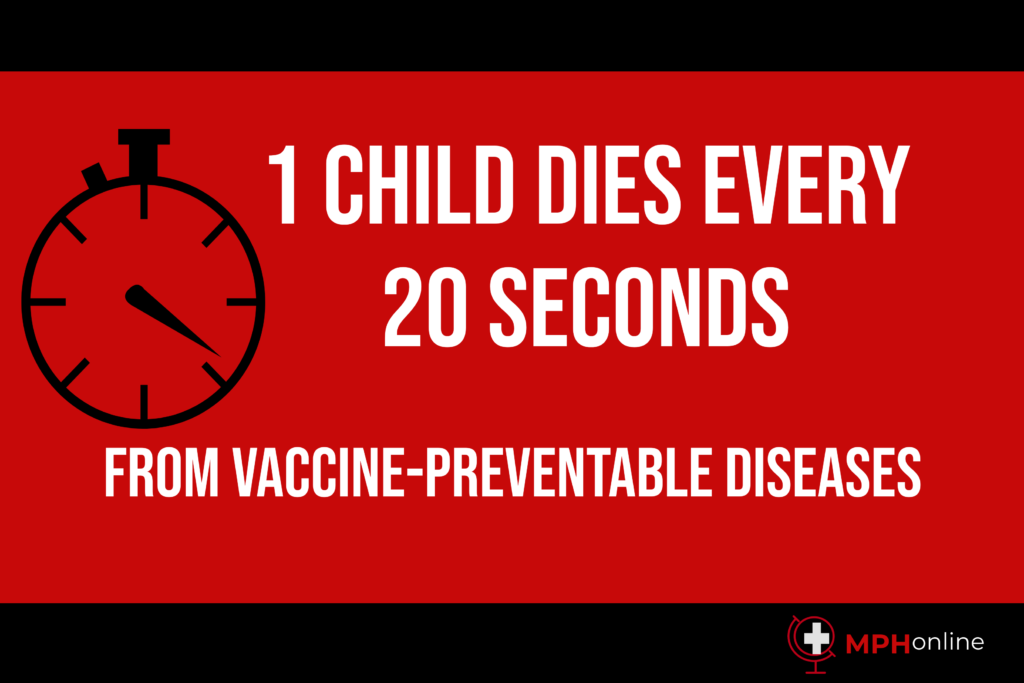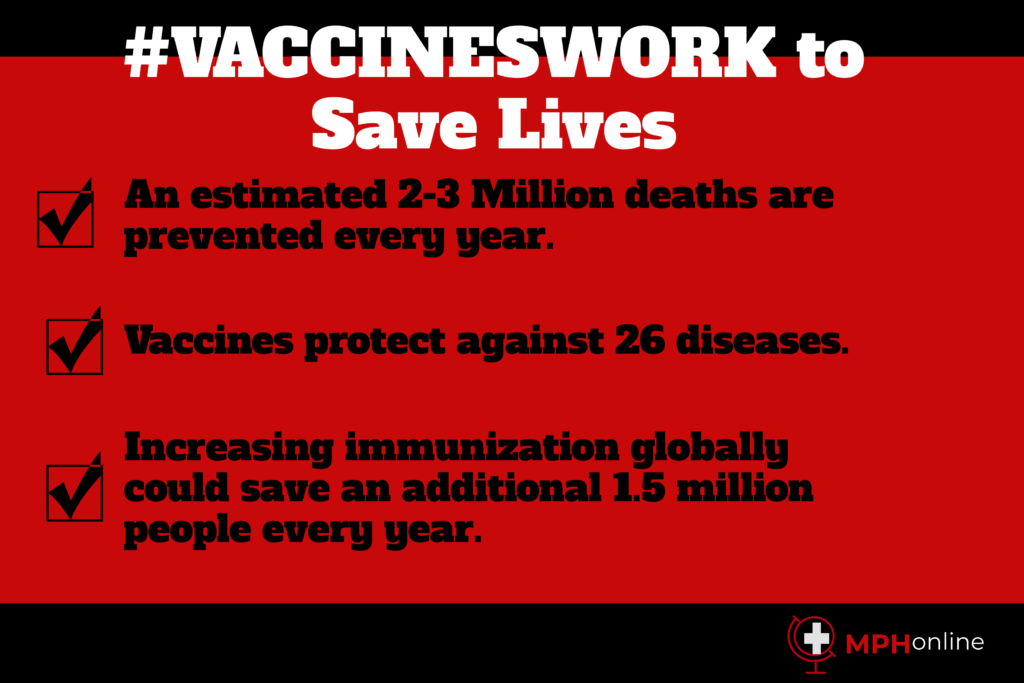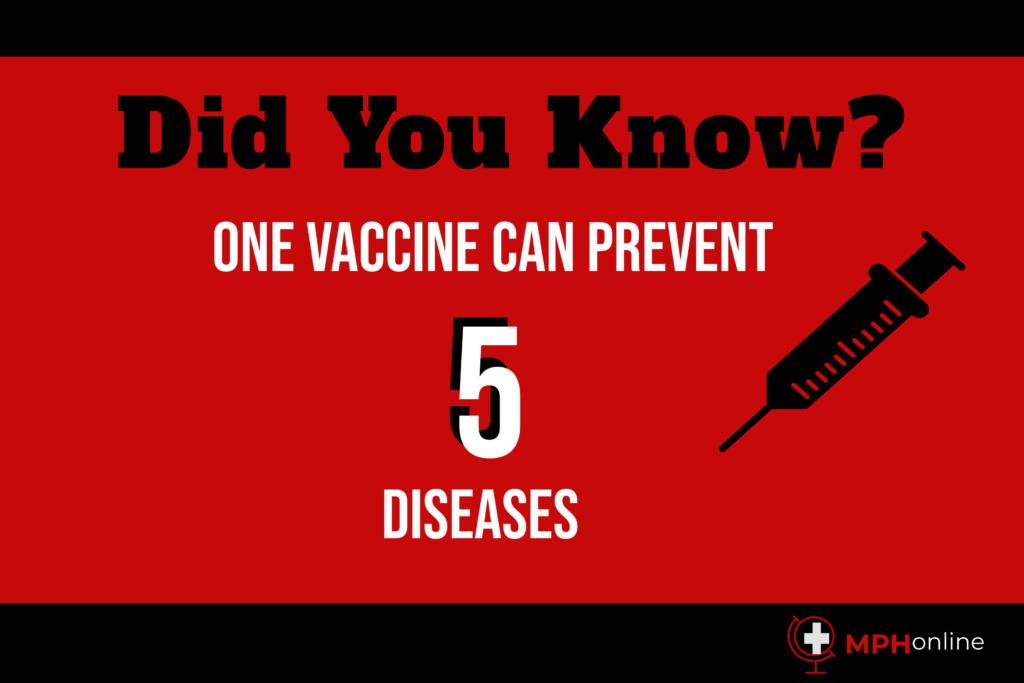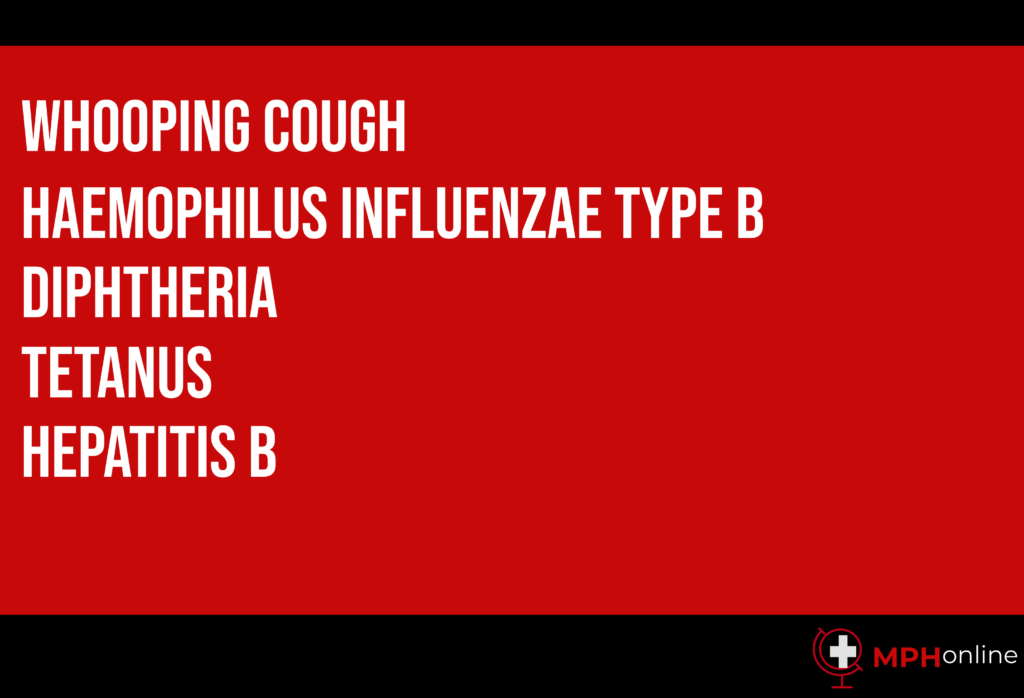Vaccines have become a major topic in the last few years, with the rise of the anti-vax movement, but it’s been especially concerning with the global COVID-19 pandemic. According to the NIH – the National Institutes for Health, it is estimated that vaccines (technically, biologic compounds) are likely responsible for saving more lives over the past 100 years than any other single medical technological invention.

Why is Vaccination a Public Health Issue?
The connection between public health and vaccines goes back more than two centuries ago, to 1796 when the first vaccination was developed to eradicate the devastating and widespread effects of smallpox. Since Dr. Edward Jenner discovered a smallpox vaccine, there have been dozens upon dozens of vaccines that have helped millions of people avoid the impact and suffering caused by devastating diseases that are easily transmitted from person to person.
As such, vaccines and public health problems are, as history has taught, directly connected. Vaccination is a critical part of preventative health care, the backbone of public health.
It is noted that there is a recent push-back trend regarding the use (and side effects) of vaccinations that have caused an alarming number of people to decline recommended inoculations. Public health officials remain concerned about the consequences resulting from the denial of vaccinations in the near future, and beyond.
What are Vaccines & How Do They Work?
The term vaccine comes from a variation of the Latin variolate vaccinae, which means cowpox. The narrative that follows answers these questions regarding why vaccination is important –
- What are vaccines made of, and why is vaccination important for school-age children?
- How do vaccines work against viruses?
- How long do vaccines take to work when used therapeutically?
- How do vaccines work, when used preventively?
- How long do vaccines take to work?
- What is a vaccine and how do they work?

What are Vaccines?
Vaccines are biological preparations that provide individuals with the ability to acquire an infectious disease’s immunity, thereby preventing those who receive the vaccine from contracting a particular infectious disease.
The process by which a vaccine is administered is known as a vaccination. Vaccinations are the most effective medical treatment in the prevention of infectious diseases throughout the world.
How do Vaccines Work & What are Vaccines Made of?
A vaccine is generally made from substances that closely resemble a weakened version (or even dead cells) of the disease-causing agent. This weakened version stimulates the immune system to recognize this agent as a threat and to kill the agent then, and in the future, should its presence be sensed by the body’s immune system.
What is a Vaccine and How do They Work?
The effectiveness of vaccinations has been studied and re-studied for decades, with remarkable evidence for vaccines that combat –
- Measles
- Tetanus
- Chicken Pox
- Polio
- And the Flu, to name a few.
Why are Vaccinations Important?
The importance of vaccines in public health cannot be overstated. Public Health initiatives try to educate the public regarding the importance of immunization to prevent diseases that can ultimately be prevented with important vaccines.
Why are Vaccines and Immunization important? And Why is it Important to Vaccinate?
Vaccines save lives, which is why vaccination is important when good vaccines are available and readily accessible. Vaccines also offer protection against the consequences of infectious diseases, which often become lifelong medical issues for the patient. The potential for lifelong chronic illness is another reason why vaccinations are important and why vaccines are good and useful in the prevention of infectious diseases. If you need to delve deep into why vaccines are important – find the answers to these questions –
- Why are vaccines important for children?
- Which vaccines are necessary when traveling internationally?
- How does the importance of vaccinations impact the elderly population?
- Which vaccines are necessary for infants?
- How important are vaccines for women during pregnancy?
- How does the importance of vaccines in public health policies impact healthcare costs in the US?
- Why are vaccines important for all ages of the population?

The CDC = The Centers for Disease Control and Prevention
The Centers for Disease Control and Prevention (CDC) is the nation’s leading public health authority, managed by the federal government under the Department of Health and Human Services. The CDC focuses on –
- Good vaccines for infectious diseases.
- Foodborne illness.
- Occupational health/safety.
- Health Promotion, among other goals.
The primary objective of the CDC is to protect the health of the American public and the world. The CDC meets its goals regarding infectious and contagious diseases as follows –
- The CDC issues guidance as to why vaccinations are important in the control and prevention of infectious diseases.
- The CDC creates educational programs to help local agencies answer community members’ questions like – Why are vaccinations important in our community?
- The CDC offers support services to communities when the importance of vaccines and the importance of vaccinations is essential to maintain public health – like now – during a pandemic.
A Word About COVID – 19 – and Why Vaccines are Important
According to the CDC, vaccination administration is considered an essential medical service.
With the onset of COVID – 19, the ways in which the world – especially the health care sector – operate at a modified pace and methods. Even routine essential services have been modified to accommodate the necessary measures created by social distancing and government stay-at-home orders.
Why are Vaccinations Important with the onset of COVID – 19?
The COVID-19 pandemic is a perfect, if not unfortunate, example that answers the question – Why is vaccination important? COVID-19, as a highly infectious disease, has spread across the world in breakneck speed, which has medical researchers and epidemiologists scrambling professionally to create a vaccine to hopefully begin to slow the spread of COVID – 19, while the world practices social distancing.
When a vaccine is finally developed to stop the spread of COVID-19, the importance of vaccinations will have reached its pinnacle as a medical marvel. The world can begin to try to return to some semblance of normalcy when effective and important vaccines are finally developed and available to the masses.
Why Are Vaccines Important with the Upcoming Influenza Season?
As the world and country work to contain COVID – 19, medical professionals are now gearing up to vaccinate those vulnerable portions of the population who often face more devastating effects of the yearly flu season. Existing flu vaccinations help alleviate distressing respiratory symptoms, which is another reason why vaccines are good public health measures.
It is essential that routine, important vaccines be administered during the COVID – 19 pandemic, in accordance with immunization schedules issued by the Centers for Disease Control and Prevention. The importance of vaccines of a routine nature should be considered for –
- Children – why vaccinations are important in this regard is to address the transmission of Hepatitis B from mother to child during health care disruptions caused by the coronavirus.
- The Elderly and the Infirm
- Pregnant Women
Why is Vaccination Important to those Individual Confirmed (or Suspected) of COVID – 19?
Routine vaccinations should be deferred to those patients who have, or suspected to have, the coronavirus, regardless of the presence or depth of manifesting symptoms – until such time the patient has met the detailed isolation guidelines for the area in which they reside. This guidance is to avoid the unnecessary exposure of health care workers to COVID – 19.
Delivering Vaccines Safely During the COVID – 19 Pandemic
It is important for healthcare professionals to follow accepted infection prevention protocols closely with any patient encounter during the COVID – 19 outbreak. This is because COVID – 19 is easily transmitted from asymptomatic patients, which makes infection prevention even more critical than ever. Health care professionals should mitigate their chances of exposure by –
- Screening for symptoms with individuals.
- Creating mandatory mask/face covering policies.
- Installing antibacterial lotion stations.
- Following infection control protocols.
- Wearing eye protection.
- Maintaining social distancing, when possible and necessary.
What Diseases have Vaccines Eradicated?
When considering the benefits of vaccines, it is important to answer these questions –
- How many lives are saved by vaccines?
- Why is vaccination important, and what benefits does it offer?
- What diseases have vaccinations eradicated, and how many lives saved by vaccines?
- How many lives have been saved by vaccines worldwide?
- How many diseases eradicated by vaccine have reappeared, if any?

The reality is, there are diseases eradicated by vaccine by public health initiatives that highly recommend a vaccination. For instance, smallpox and rinderpest (a known cattle disease) have been eradicated with the use of vaccines given preventatively and therapeutically, as necessary.
There are many examples of diseases that have been almost eradicated (that is, mightily controlled) by vaccines –
- Measles
- Mumps
- Rubella
- Tetanus
- Diphtheria
- Bacterial Influenza, among others.
What is the Public Health Cost of Not Vaccinating?
Many health care organizations seek to analyze the dangers of not vaccinating the public, based on the cost of not vaccinating proactively. According to IntelliCentrics, it is estimated, by the University of North Carolina at Chapel Hill researchers that unvaccinated adults in the nation generate health care costs that exceed $7 billion – and that was five years ago, in 2015.
The study noted looked at the cost and the danger of not vaccinating based on ten vaccines which include the flu, measles, mumps, tetanus, diphtheria, meningitis, pneumonia, and rubella, among several others. The cost and danger of not vaccinating for the flu accounted for the most costs/lost productivity.
Related:
Top 25 Online MPH in Epidemiology